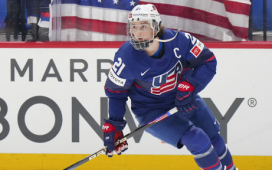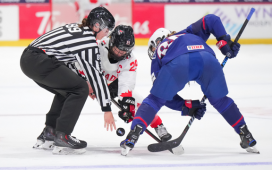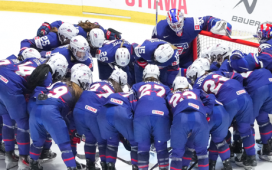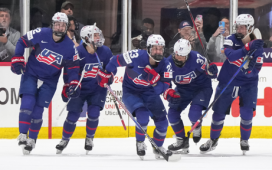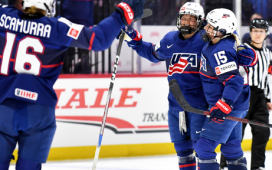The clean slate with which the Golden Knights were once able to work has disappeared, and with it so has the thinking that seemingly set Vegas apart.

You get to start fresh, you don’t have to dig out from under anything. You don’t have bad contracts to deal with or a losing culture or people who need to be changed. You don’t have any of that.
– Former Vegas Golden Knights GM George McPhee in 2017, on the appeal of running an expansion team
It’s probably a bit of a stretch to suggest that Gerard Gallant was a victim of his own success, but there’s little doubt he helped create the expectations that led to his firing. For at least the first five years of their existence, expansion teams are supposed to be cute and cuddly, a nice little toy to which the rest of the league gets to donate its junk, then has the pleasure of kicking around.
In record time, McPhee and Gallant and the Golden Knights turned that notion on its head. In fact, the ‘Golden Misfits’ moniker they gave themselves turned out to have an incredibly short shelf life. Not only did the Golden Knights set records for expansion team success, with the firing of Gallant they also set a record for becoming a typically predictable NHL team, right down to going back to the NHL’s recycling bin to get Gallant’s replacement.
Now if you had said prior to the Golden Knights’ first season that Gallant would be fired 49 games into his and the franchise’s third season, that would have seemed like a fairly reasonable prediction at the time. But you would have thought it would have been after 2-1/2 years of the losing, boring hockey that follows expansion teams around. But not like this. Not after leading an expansion team to the Stanley Cup final in the first year, losing in the first round of the playoffs in controversial fashion in the second, then falling just out of a wildcard playoff spot midway through the third.
Meanwhile, that clean slate that McPhee talked about three years ago is starting to get a little clogged up. The Golden Knights have been able to stay away from soul-sucking contracts for the most part, but they’re already right up against the salary cap and face the prospect this summer of having to either re-sign or replace 10 players, despite having already devoted $66.5 million to the players they have. Their need to shed salary cost them Erik Haula, an expansion draft pick-up who scored 55 points in his first season with the Golden Knights. They’ve traded away prospects Erik Brannstrom and Nick Suzuki in an effort to bring in high-profile players to help them win now. And that thing about not having people who needed to be changed? Well, that went out the window when they fired Gallant.
In fact, had the whole thing not been accelerated by the first season, the Golden Knights probably don’t trade for Mark Stone and Max Pacioretty, nor do they sign Paul Stastny as an unrestricted free agent. And as good as those players are, they were all interlopers compared to the original Golden Knights. Now, there’s not a skater on the Vegas roster who makes as much money as any of those three. You have to wonder whether their acquisitions have had an effect on players such as William Karlsson and Jonathan Marchessault, players whose totals dipped significantly after Pacioretty and Stone were added. They both had career years in 2017-18 and perhaps it wasn’t sustainable. They were both getting roughly the same amount of ice time under Gallant as they did in the first year, but it’s undeniable that the Golden Knights scored more goals and had more success, both in the regular season and the playoffs, in their first season than they have ever had since.
Some of that has to do with goaltending, another area where the Golden Knights have not been near as good as they were in their inaugural season. In fact, there’s a lot about that first year that was a complete outlier. It seemed Vegas could do absolutely no wrong in its first season. Even when their goaltenders went down and they had to mine deep into their organization, they were getting the saves they needed and they were winning games. Players who had been cast off by other organizations and were not given a front-line opportunity had career years and every time a bounce could have gone one way or another for them, it always seemed to go their way.
Well, anyone who has been in hockey for an appreciable amount of time can tell you that kind of thing simply can’t be sustained. It started in the first round of playoffs last year when they gave up a shorthanded goal in overtime in Game 6, then received a major penalty that was a blown call and gave up four goals on the ensuing power play. Call it the work of the hockey gods, but these things seem to have a way of evening out.
It happens to everybody at some point and now it’s happening to the Golden Knights. Vegas did not once lose four games in a row in regulation in their first season. They did it once last year and have done it twice so far this season. They’re a decent team in the worst division in hockey, but still miles ahead of where anyone thought they would be at this point in their history. And now the team that did it so differently and seemed to put so much emphasis on things such as pride and loyalty used a bump in the road to release one of their best assets. In doing so, they’ve become just like everybody else.
Want more in-depth features, analysis and an All-Access pass to the latest content? Subscribe to The Hockey News magazine.


